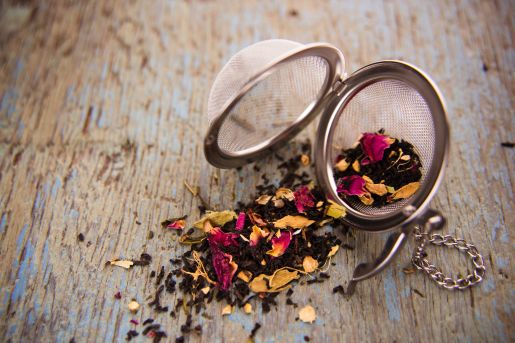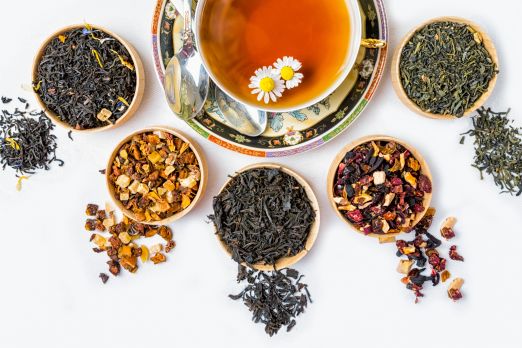Many people enjoy drinking herbal teas, which are made from plants that have medicinal properties and can provide benefits to our health.
The most common types of herbs used for herbal teas include mints, chamomile, basil, fennel, ginger and spearmint.
Some other types of herbs used for herbal teas include sage, peppermint and cinnamon (some commercial brands use these ingredients).
The most common way people consume these herbs is by drinking them as tea or using them as flavoring in food.
They usually serve the herbal teas in tea bags or other types of containers. People often drink herbal teas to help them feel relaxed, or to improve their health conditions such as sore throats, upset stomachs and headaches.
Some people use these herbs to treat colds and flu, which is why they are often found in cough syrups and other over-the-counter medications.
What Is Caffeine?
Caffeine is a bitter alkaloid found in many plants, such as coffee beans, cocoa beans, and kola nuts. It is a psychoactive drug that acts as a stimulant to the central nervous system and causes an increase in the activity of the brain cells, which results in improved mental performance and alertness.
What are the health benefits of caffeine?
Caffeine may have a wide range of health benefits. It can help boost energy levels, improve alertness and concentration, increase athletic performance and improve mental health. Caffeine can also have positive effects on the body by reducing the risk of heart disease and cancer, preventing age-related cognitive decline, boosting the immune system and reducing inflammation.
How Does Caffeine Affect Your Body?
Caffeine may have a wide range of effects on the body. It can help boost energy levels, improve alertness and concentration, increase athletic performance and improve mental health. It can also cause side effects such as insomnia, anxiety, nervousness and stomach upset if you consume too much caffeine.
Caffeine has also been shown to cause addiction, so you may want to stop consuming it because it may be difficult for you to stop drinking coffee or tea if you’ve become addicted to them.
It’s important to note that caffeine can have negative effects on people who are sensitive to it, such as those who suffer from high blood pressure or people who have a sensitivity to chemicals such as medications or drugs such as antidepressants.
The Risks Involved with Caffeine
The major risk associated with high caffeine consumption is that it can cause insomnia, anxiety, and even panic attacks. Avoid drinking too much caffeine because it can lead to insomnia, which will cause an increased risk of obesity and heart disease.
Caffeine affects different people differently, depending on their body chemistry. However, if you are sensitive to caffeine, then you should avoid drinking too much of them.

Does Herbal Tea Contain Caffeine?
The short answer is no, herbal tea does not contain caffeine. However, the long answer is that there is no one-size-fits-all answer to this question, as the caffeine content of different herbal teas can vary.
Some herbal teas, such as chamomile and lavender tea, contain very low levels of caffeine, while others, such as green tea, contain more. The reason is, caffeine is not found in most herbal teas is because it is destroyed during the brewing process.
However, if you are looking for a caffeine-free herbal tea, some brands do offer varieties that are caffeine-free. it is important to know that not all herbal teas are safe to drink regularly, so it is always best to speak with a healthcare professional before starting any new health regimen.
why you should drink herbal tea?
Herbal tea is a popular beverage that many people enjoy. Besides being rich in antioxidants, they may help reduce cholesterol levels and help with weight loss. However, there is no scientific evidence that herbal teas have any health benefits beyond those of regular black tea or coffee.
If you drink herbal teas regularly, you may cut down on your coffee or soda intake without suffering from withdrawal symptoms such as headaches and fatigue. Herbal tea is also a good choice for people who are trying to lose weight because it contains fewer calories than coffee or soda pop.
Moreover, caffeine is a stimulant that is found in many types of tea, including green and black tea. Caffeine can have some serious side effects when consumed in large amounts. If you are a coffee or soda addict, drinking herbal teas may help reduce your cravings for caffeine. Drinking herbal teas is better for your health than drinking coffee or soda pop because they don‘t contain any calories and may have some health benefits.
When you should drink herbal tea?
There is no one-size-fits-all answer to this question, as the best time to drink herbal tea depends on your individual health needs and preferences. However, many people enjoy drinking herbal tea in the morning or afternoon, when it is most relaxing. Herbal teas may also help improve overall health.
Here are some benefits of herbal teas
They Are Rich in antioxidants. The primary antioxidants in tea are polyphenols and flavonoids. The polyphenols, which include catechins, flavonoids, and proanthocyanidins, handle the bitter taste of tea.
Catechins are the most abundant of the polyphenols in tea. Antioxidants help protect against cellular damage caused by free radicals (unstable molecules that have unpaired electrons).
Antioxidants in tea have been shown to have antioxidant effects in the body, including protection against cardiovascular disease. Research shows that flavonoids may reduce blood pressure and LDL cholesterol levels when taken with a high-fat meal.
Herbal Teas Can Reduce Risk of Heart Disease and Stroke A meta-analysis published in 2008 looked at over one hundred studies on the effects of tea on heart disease risk factors such as total cholesterol, LDL cholesterol, HDL cholesterol, blood pressure, glucose levels, weight gain, and triglycerides.
In Conclusion
Herbal teas are a caffeine free drink that can provide health benefits. However, it is important to know that some herbal teas contain caffeine in small amounts and, over-consuming, it could be harmful.


